Case Study: Mental Trauma in Counselling - Coursework Analysis
VerifiedAdded on 2023/06/08
|11
|3028
|72
Case Study
AI Summary
This case study examines mental trauma through two patient scenarios, Deshna and Tony, focusing on their experiences and the application of counselling interventions. Deshna, a refugee, and Tony, a paramedic, both suffer from mental trauma due to past experiences. The study explores the importance of collaboration with family and friends to gather patient information and understand their behaviors. It delves into intervention strategies, including creating a safe and supportive environment, active listening, and offering encouragement. The case study also covers trauma assessment methods, such as questionnaires and psychological approaches, and highlights the importance of ethical principles like confidentiality and patient safety. The analysis concludes by emphasizing the challenges of working with traumatized patients and the need for effective communication and patience during the counselling process.

Case Study
Paraphrase This Document
Need a fresh take? Get an instant paraphrase of this document with our AI Paraphraser

Table of Contents
INTRODUCTION...........................................................................................................................1
MAIN BODY...................................................................................................................................1
CONCLUSION................................................................................................................................1
REFERENCES................................................................................................................................2
INTRODUCTION...........................................................................................................................1
MAIN BODY...................................................................................................................................1
CONCLUSION................................................................................................................................1
REFERENCES................................................................................................................................2
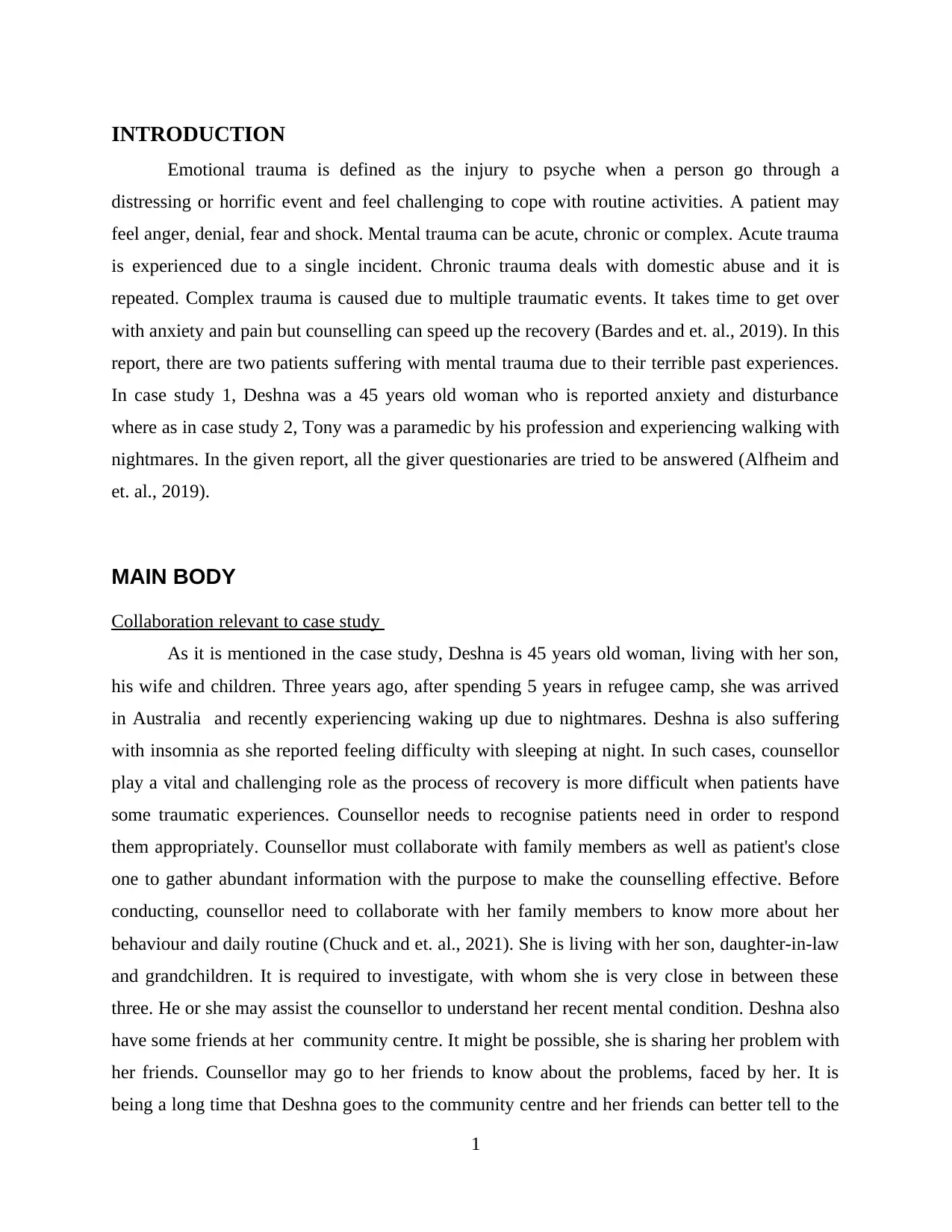
INTRODUCTION
Emotional trauma is defined as the injury to psyche when a person go through a
distressing or horrific event and feel challenging to cope with routine activities. A patient may
feel anger, denial, fear and shock. Mental trauma can be acute, chronic or complex. Acute trauma
is experienced due to a single incident. Chronic trauma deals with domestic abuse and it is
repeated. Complex trauma is caused due to multiple traumatic events. It takes time to get over
with anxiety and pain but counselling can speed up the recovery (Bardes and et. al., 2019). In this
report, there are two patients suffering with mental trauma due to their terrible past experiences.
In case study 1, Deshna was a 45 years old woman who is reported anxiety and disturbance
where as in case study 2, Tony was a paramedic by his profession and experiencing walking with
nightmares. In the given report, all the giver questionaries are tried to be answered (Alfheim and
et. al., 2019).
MAIN BODY
Collaboration relevant to case study
As it is mentioned in the case study, Deshna is 45 years old woman, living with her son,
his wife and children. Three years ago, after spending 5 years in refugee camp, she was arrived
in Australia and recently experiencing waking up due to nightmares. Deshna is also suffering
with insomnia as she reported feeling difficulty with sleeping at night. In such cases, counsellor
play a vital and challenging role as the process of recovery is more difficult when patients have
some traumatic experiences. Counsellor needs to recognise patients need in order to respond
them appropriately. Counsellor must collaborate with family members as well as patient's close
one to gather abundant information with the purpose to make the counselling effective. Before
conducting, counsellor need to collaborate with her family members to know more about her
behaviour and daily routine (Chuck and et. al., 2021). She is living with her son, daughter-in-law
and grandchildren. It is required to investigate, with whom she is very close in between these
three. He or she may assist the counsellor to understand her recent mental condition. Deshna also
have some friends at her community centre. It might be possible, she is sharing her problem with
her friends. Counsellor may go to her friends to know about the problems, faced by her. It is
being a long time that Deshna goes to the community centre and her friends can better tell to the
1
Emotional trauma is defined as the injury to psyche when a person go through a
distressing or horrific event and feel challenging to cope with routine activities. A patient may
feel anger, denial, fear and shock. Mental trauma can be acute, chronic or complex. Acute trauma
is experienced due to a single incident. Chronic trauma deals with domestic abuse and it is
repeated. Complex trauma is caused due to multiple traumatic events. It takes time to get over
with anxiety and pain but counselling can speed up the recovery (Bardes and et. al., 2019). In this
report, there are two patients suffering with mental trauma due to their terrible past experiences.
In case study 1, Deshna was a 45 years old woman who is reported anxiety and disturbance
where as in case study 2, Tony was a paramedic by his profession and experiencing walking with
nightmares. In the given report, all the giver questionaries are tried to be answered (Alfheim and
et. al., 2019).
MAIN BODY
Collaboration relevant to case study
As it is mentioned in the case study, Deshna is 45 years old woman, living with her son,
his wife and children. Three years ago, after spending 5 years in refugee camp, she was arrived
in Australia and recently experiencing waking up due to nightmares. Deshna is also suffering
with insomnia as she reported feeling difficulty with sleeping at night. In such cases, counsellor
play a vital and challenging role as the process of recovery is more difficult when patients have
some traumatic experiences. Counsellor needs to recognise patients need in order to respond
them appropriately. Counsellor must collaborate with family members as well as patient's close
one to gather abundant information with the purpose to make the counselling effective. Before
conducting, counsellor need to collaborate with her family members to know more about her
behaviour and daily routine (Chuck and et. al., 2021). She is living with her son, daughter-in-law
and grandchildren. It is required to investigate, with whom she is very close in between these
three. He or she may assist the counsellor to understand her recent mental condition. Deshna also
have some friends at her community centre. It might be possible, she is sharing her problem with
her friends. Counsellor may go to her friends to know about the problems, faced by her. It is
being a long time that Deshna goes to the community centre and her friends can better tell to the
1
⊘ This is a preview!⊘
Do you want full access?
Subscribe today to unlock all pages.

Trusted by 1+ million students worldwide
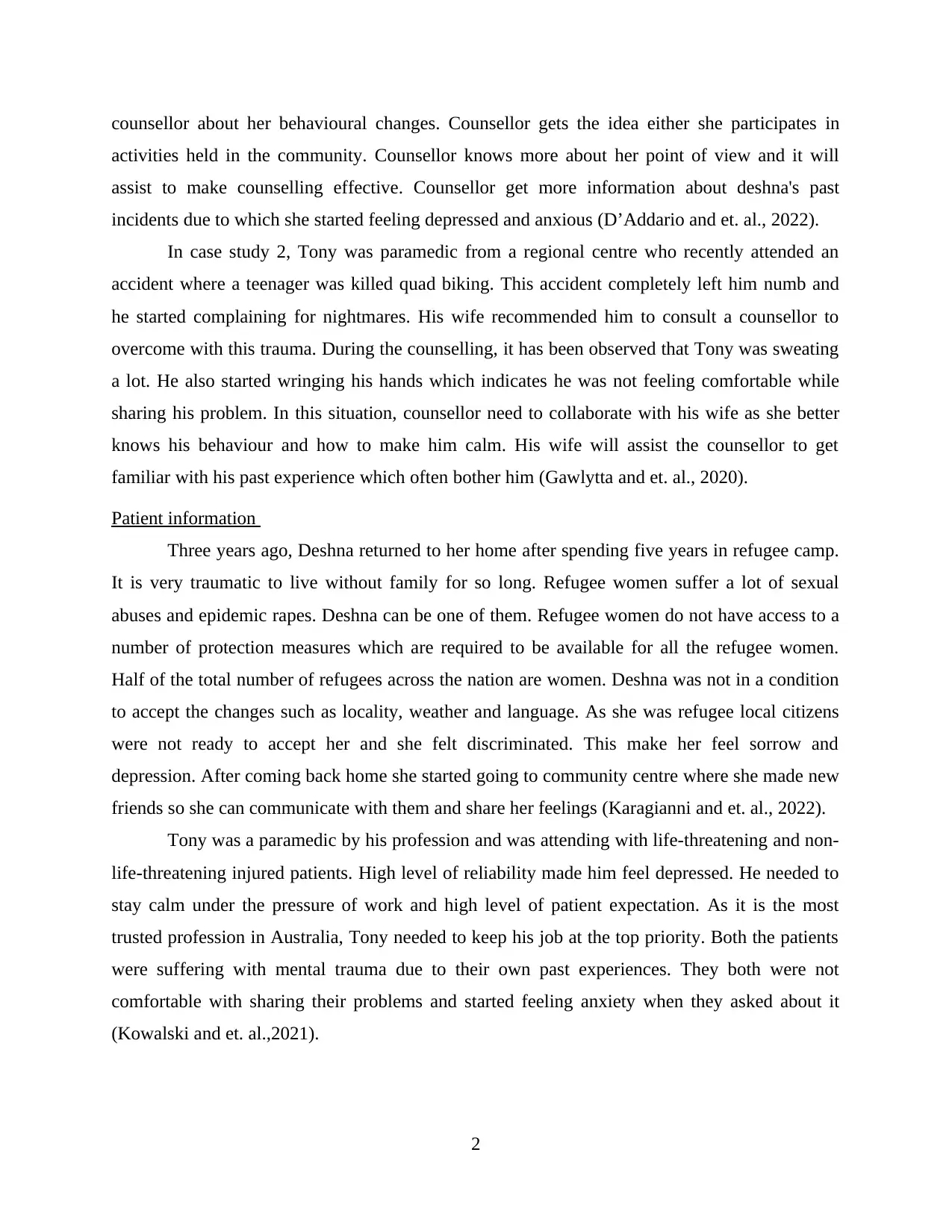
counsellor about her behavioural changes. Counsellor gets the idea either she participates in
activities held in the community. Counsellor knows more about her point of view and it will
assist to make counselling effective. Counsellor get more information about deshna's past
incidents due to which she started feeling depressed and anxious (D’Addario and et. al., 2022).
In case study 2, Tony was paramedic from a regional centre who recently attended an
accident where a teenager was killed quad biking. This accident completely left him numb and
he started complaining for nightmares. His wife recommended him to consult a counsellor to
overcome with this trauma. During the counselling, it has been observed that Tony was sweating
a lot. He also started wringing his hands which indicates he was not feeling comfortable while
sharing his problem. In this situation, counsellor need to collaborate with his wife as she better
knows his behaviour and how to make him calm. His wife will assist the counsellor to get
familiar with his past experience which often bother him (Gawlytta and et. al., 2020).
Patient information
Three years ago, Deshna returned to her home after spending five years in refugee camp.
It is very traumatic to live without family for so long. Refugee women suffer a lot of sexual
abuses and epidemic rapes. Deshna can be one of them. Refugee women do not have access to a
number of protection measures which are required to be available for all the refugee women.
Half of the total number of refugees across the nation are women. Deshna was not in a condition
to accept the changes such as locality, weather and language. As she was refugee local citizens
were not ready to accept her and she felt discriminated. This make her feel sorrow and
depression. After coming back home she started going to community centre where she made new
friends so she can communicate with them and share her feelings (Karagianni and et. al., 2022).
Tony was a paramedic by his profession and was attending with life-threatening and non-
life-threatening injured patients. High level of reliability made him feel depressed. He needed to
stay calm under the pressure of work and high level of patient expectation. As it is the most
trusted profession in Australia, Tony needed to keep his job at the top priority. Both the patients
were suffering with mental trauma due to their own past experiences. They both were not
comfortable with sharing their problems and started feeling anxiety when they asked about it
(Kowalski and et. al.,2021).
2
activities held in the community. Counsellor knows more about her point of view and it will
assist to make counselling effective. Counsellor get more information about deshna's past
incidents due to which she started feeling depressed and anxious (D’Addario and et. al., 2022).
In case study 2, Tony was paramedic from a regional centre who recently attended an
accident where a teenager was killed quad biking. This accident completely left him numb and
he started complaining for nightmares. His wife recommended him to consult a counsellor to
overcome with this trauma. During the counselling, it has been observed that Tony was sweating
a lot. He also started wringing his hands which indicates he was not feeling comfortable while
sharing his problem. In this situation, counsellor need to collaborate with his wife as she better
knows his behaviour and how to make him calm. His wife will assist the counsellor to get
familiar with his past experience which often bother him (Gawlytta and et. al., 2020).
Patient information
Three years ago, Deshna returned to her home after spending five years in refugee camp.
It is very traumatic to live without family for so long. Refugee women suffer a lot of sexual
abuses and epidemic rapes. Deshna can be one of them. Refugee women do not have access to a
number of protection measures which are required to be available for all the refugee women.
Half of the total number of refugees across the nation are women. Deshna was not in a condition
to accept the changes such as locality, weather and language. As she was refugee local citizens
were not ready to accept her and she felt discriminated. This make her feel sorrow and
depression. After coming back home she started going to community centre where she made new
friends so she can communicate with them and share her feelings (Karagianni and et. al., 2022).
Tony was a paramedic by his profession and was attending with life-threatening and non-
life-threatening injured patients. High level of reliability made him feel depressed. He needed to
stay calm under the pressure of work and high level of patient expectation. As it is the most
trusted profession in Australia, Tony needed to keep his job at the top priority. Both the patients
were suffering with mental trauma due to their own past experiences. They both were not
comfortable with sharing their problems and started feeling anxiety when they asked about it
(Kowalski and et. al.,2021).
2
Paraphrase This Document
Need a fresh take? Get an instant paraphrase of this document with our AI Paraphraser
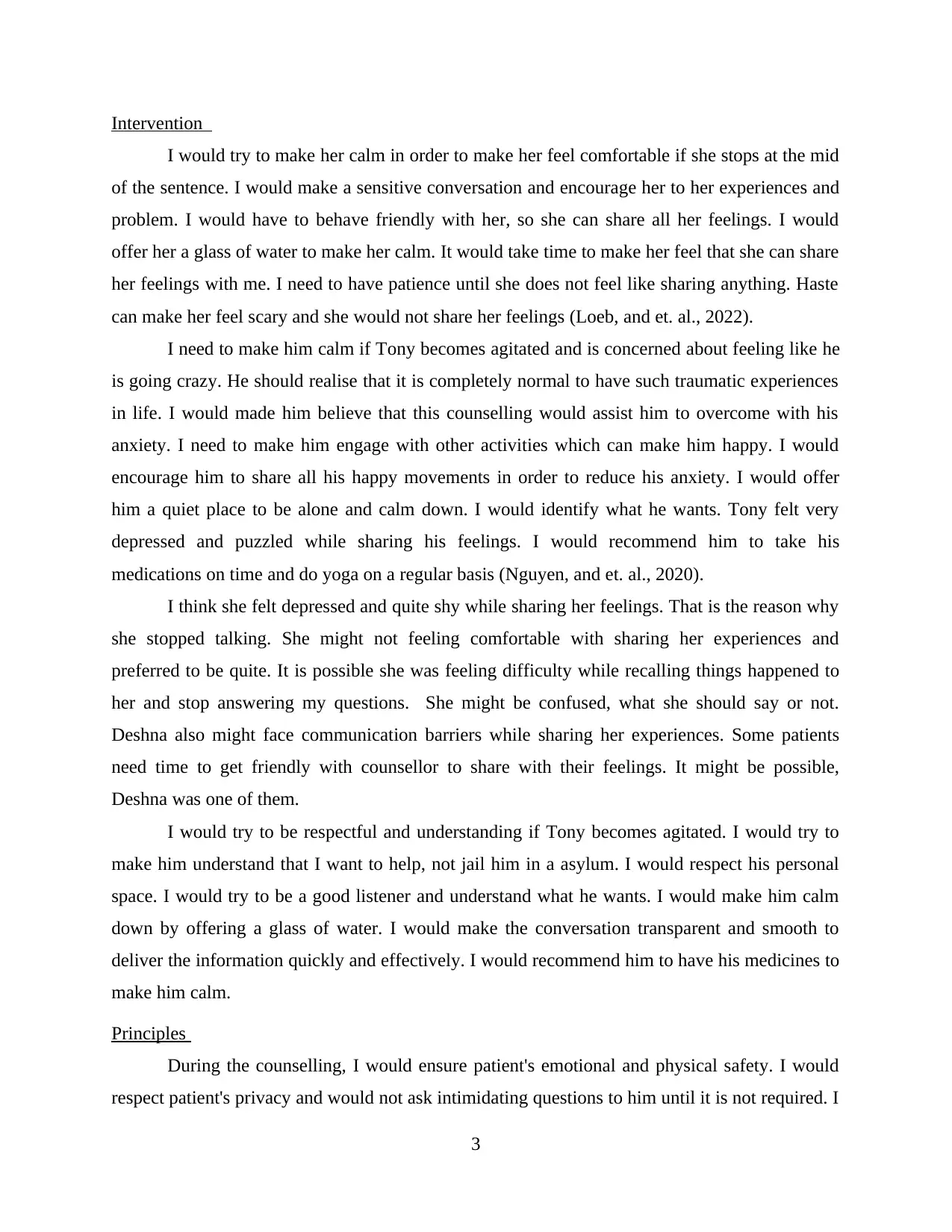
Intervention
I would try to make her calm in order to make her feel comfortable if she stops at the mid
of the sentence. I would make a sensitive conversation and encourage her to her experiences and
problem. I would have to behave friendly with her, so she can share all her feelings. I would
offer her a glass of water to make her calm. It would take time to make her feel that she can share
her feelings with me. I need to have patience until she does not feel like sharing anything. Haste
can make her feel scary and she would not share her feelings (Loeb, and et. al., 2022).
I need to make him calm if Tony becomes agitated and is concerned about feeling like he
is going crazy. He should realise that it is completely normal to have such traumatic experiences
in life. I would made him believe that this counselling would assist him to overcome with his
anxiety. I need to make him engage with other activities which can make him happy. I would
encourage him to share all his happy movements in order to reduce his anxiety. I would offer
him a quiet place to be alone and calm down. I would identify what he wants. Tony felt very
depressed and puzzled while sharing his feelings. I would recommend him to take his
medications on time and do yoga on a regular basis (Nguyen, and et. al., 2020).
I think she felt depressed and quite shy while sharing her feelings. That is the reason why
she stopped talking. She might not feeling comfortable with sharing her experiences and
preferred to be quite. It is possible she was feeling difficulty while recalling things happened to
her and stop answering my questions. She might be confused, what she should say or not.
Deshna also might face communication barriers while sharing her experiences. Some patients
need time to get friendly with counsellor to share with their feelings. It might be possible,
Deshna was one of them.
I would try to be respectful and understanding if Tony becomes agitated. I would try to
make him understand that I want to help, not jail him in a asylum. I would respect his personal
space. I would try to be a good listener and understand what he wants. I would make him calm
down by offering a glass of water. I would make the conversation transparent and smooth to
deliver the information quickly and effectively. I would recommend him to have his medicines to
make him calm.
Principles
During the counselling, I would ensure patient's emotional and physical safety. I would
respect patient's privacy and would not ask intimidating questions to him until it is not required. I
3
I would try to make her calm in order to make her feel comfortable if she stops at the mid
of the sentence. I would make a sensitive conversation and encourage her to her experiences and
problem. I would have to behave friendly with her, so she can share all her feelings. I would
offer her a glass of water to make her calm. It would take time to make her feel that she can share
her feelings with me. I need to have patience until she does not feel like sharing anything. Haste
can make her feel scary and she would not share her feelings (Loeb, and et. al., 2022).
I need to make him calm if Tony becomes agitated and is concerned about feeling like he
is going crazy. He should realise that it is completely normal to have such traumatic experiences
in life. I would made him believe that this counselling would assist him to overcome with his
anxiety. I need to make him engage with other activities which can make him happy. I would
encourage him to share all his happy movements in order to reduce his anxiety. I would offer
him a quiet place to be alone and calm down. I would identify what he wants. Tony felt very
depressed and puzzled while sharing his feelings. I would recommend him to take his
medications on time and do yoga on a regular basis (Nguyen, and et. al., 2020).
I think she felt depressed and quite shy while sharing her feelings. That is the reason why
she stopped talking. She might not feeling comfortable with sharing her experiences and
preferred to be quite. It is possible she was feeling difficulty while recalling things happened to
her and stop answering my questions. She might be confused, what she should say or not.
Deshna also might face communication barriers while sharing her experiences. Some patients
need time to get friendly with counsellor to share with their feelings. It might be possible,
Deshna was one of them.
I would try to be respectful and understanding if Tony becomes agitated. I would try to
make him understand that I want to help, not jail him in a asylum. I would respect his personal
space. I would try to be a good listener and understand what he wants. I would make him calm
down by offering a glass of water. I would make the conversation transparent and smooth to
deliver the information quickly and effectively. I would recommend him to have his medicines to
make him calm.
Principles
During the counselling, I would ensure patient's emotional and physical safety. I would
respect patient's privacy and would not ask intimidating questions to him until it is not required. I
3
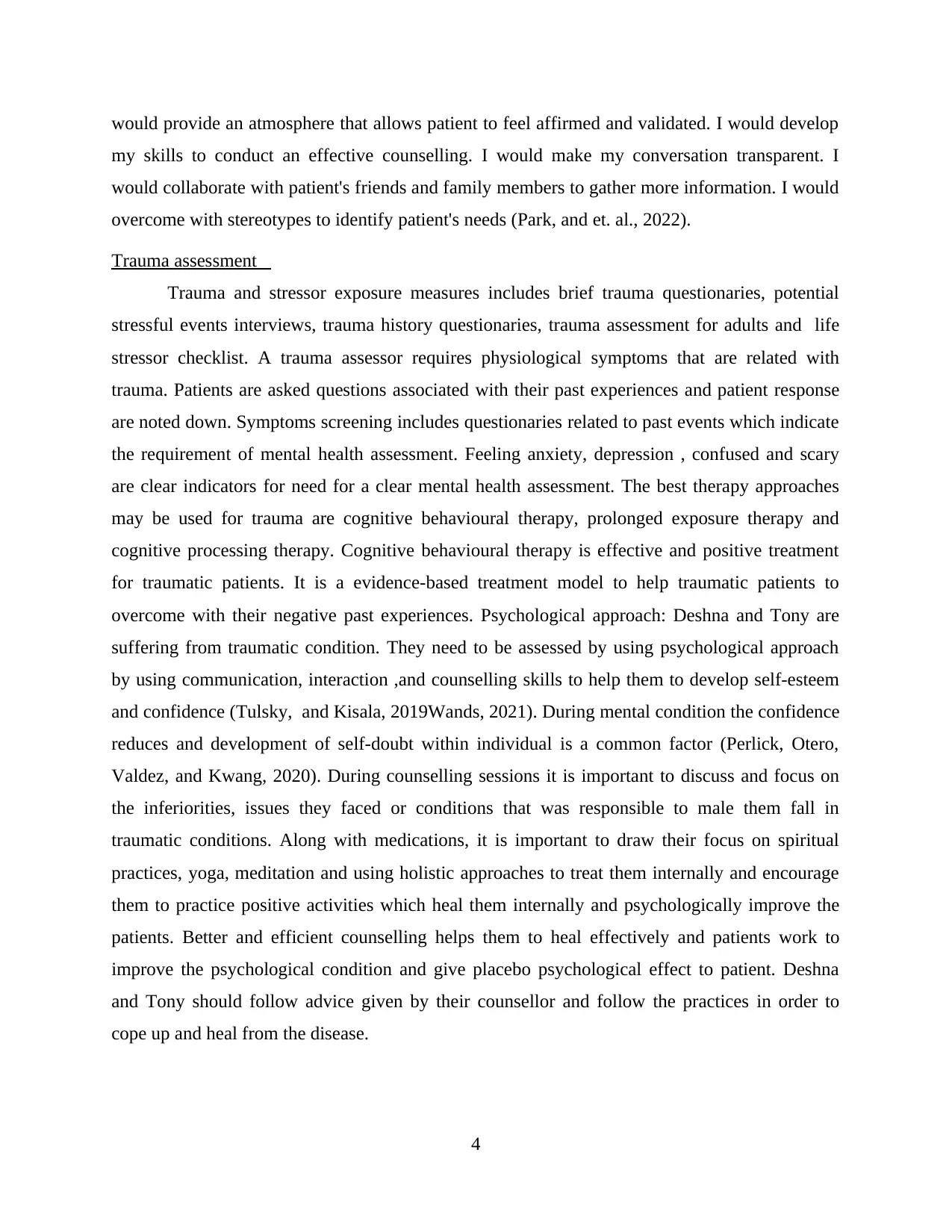
would provide an atmosphere that allows patient to feel affirmed and validated. I would develop
my skills to conduct an effective counselling. I would make my conversation transparent. I
would collaborate with patient's friends and family members to gather more information. I would
overcome with stereotypes to identify patient's needs (Park, and et. al., 2022).
Trauma assessment
Trauma and stressor exposure measures includes brief trauma questionaries, potential
stressful events interviews, trauma history questionaries, trauma assessment for adults and life
stressor checklist. A trauma assessor requires physiological symptoms that are related with
trauma. Patients are asked questions associated with their past experiences and patient response
are noted down. Symptoms screening includes questionaries related to past events which indicate
the requirement of mental health assessment. Feeling anxiety, depression , confused and scary
are clear indicators for need for a clear mental health assessment. The best therapy approaches
may be used for trauma are cognitive behavioural therapy, prolonged exposure therapy and
cognitive processing therapy. Cognitive behavioural therapy is effective and positive treatment
for traumatic patients. It is a evidence-based treatment model to help traumatic patients to
overcome with their negative past experiences. Psychological approach: Deshna and Tony are
suffering from traumatic condition. They need to be assessed by using psychological approach
by using communication, interaction ,and counselling skills to help them to develop self-esteem
and confidence (Tulsky, and Kisala, 2019Wands, 2021). During mental condition the confidence
reduces and development of self-doubt within individual is a common factor (Perlick, Otero,
Valdez, and Kwang, 2020). During counselling sessions it is important to discuss and focus on
the inferiorities, issues they faced or conditions that was responsible to male them fall in
traumatic conditions. Along with medications, it is important to draw their focus on spiritual
practices, yoga, meditation and using holistic approaches to treat them internally and encourage
them to practice positive activities which heal them internally and psychologically improve the
patients. Better and efficient counselling helps them to heal effectively and patients work to
improve the psychological condition and give placebo psychological effect to patient. Deshna
and Tony should follow advice given by their counsellor and follow the practices in order to
cope up and heal from the disease.
4
my skills to conduct an effective counselling. I would make my conversation transparent. I
would collaborate with patient's friends and family members to gather more information. I would
overcome with stereotypes to identify patient's needs (Park, and et. al., 2022).
Trauma assessment
Trauma and stressor exposure measures includes brief trauma questionaries, potential
stressful events interviews, trauma history questionaries, trauma assessment for adults and life
stressor checklist. A trauma assessor requires physiological symptoms that are related with
trauma. Patients are asked questions associated with their past experiences and patient response
are noted down. Symptoms screening includes questionaries related to past events which indicate
the requirement of mental health assessment. Feeling anxiety, depression , confused and scary
are clear indicators for need for a clear mental health assessment. The best therapy approaches
may be used for trauma are cognitive behavioural therapy, prolonged exposure therapy and
cognitive processing therapy. Cognitive behavioural therapy is effective and positive treatment
for traumatic patients. It is a evidence-based treatment model to help traumatic patients to
overcome with their negative past experiences. Psychological approach: Deshna and Tony are
suffering from traumatic condition. They need to be assessed by using psychological approach
by using communication, interaction ,and counselling skills to help them to develop self-esteem
and confidence (Tulsky, and Kisala, 2019Wands, 2021). During mental condition the confidence
reduces and development of self-doubt within individual is a common factor (Perlick, Otero,
Valdez, and Kwang, 2020). During counselling sessions it is important to discuss and focus on
the inferiorities, issues they faced or conditions that was responsible to male them fall in
traumatic conditions. Along with medications, it is important to draw their focus on spiritual
practices, yoga, meditation and using holistic approaches to treat them internally and encourage
them to practice positive activities which heal them internally and psychologically improve the
patients. Better and efficient counselling helps them to heal effectively and patients work to
improve the psychological condition and give placebo psychological effect to patient. Deshna
and Tony should follow advice given by their counsellor and follow the practices in order to
cope up and heal from the disease.
4
⊘ This is a preview!⊘
Do you want full access?
Subscribe today to unlock all pages.

Trusted by 1+ million students worldwide
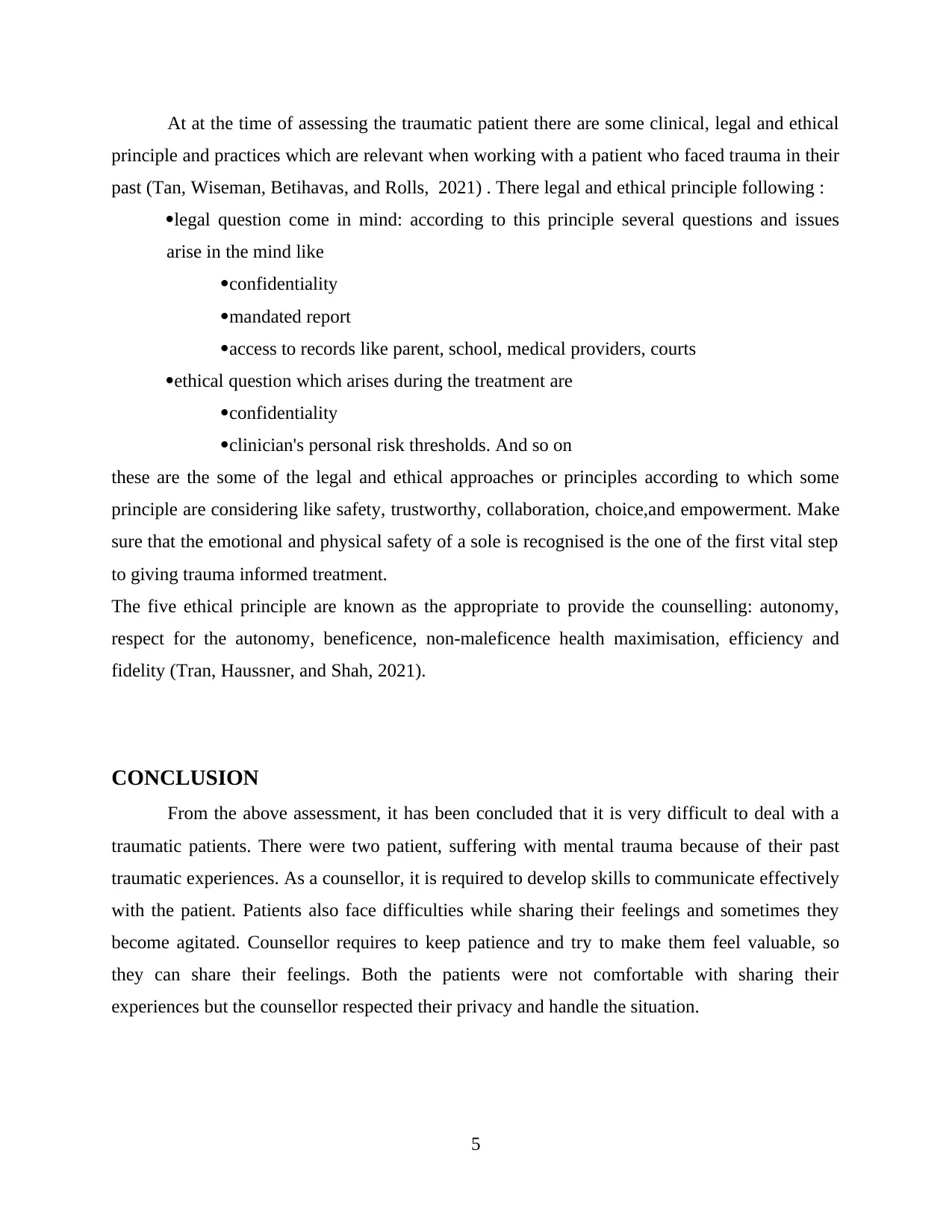
At at the time of assessing the traumatic patient there are some clinical, legal and ethical
principle and practices which are relevant when working with a patient who faced trauma in their
past (Tan, Wiseman, Betihavas, and Rolls, 2021) . There legal and ethical principle following :
legal question come in mind: according to this principle several questions and issues
arise in the mind like
confidentiality
mandated report
access to records like parent, school, medical providers, courts
ethical question which arises during the treatment are
confidentiality
clinician's personal risk thresholds. And so on
these are the some of the legal and ethical approaches or principles according to which some
principle are considering like safety, trustworthy, collaboration, choice,and empowerment. Make
sure that the emotional and physical safety of a sole is recognised is the one of the first vital step
to giving trauma informed treatment.
The five ethical principle are known as the appropriate to provide the counselling: autonomy,
respect for the autonomy, beneficence, non-maleficence health maximisation, efficiency and
fidelity (Tran, Haussner, and Shah, 2021).
CONCLUSION
From the above assessment, it has been concluded that it is very difficult to deal with a
traumatic patients. There were two patient, suffering with mental trauma because of their past
traumatic experiences. As a counsellor, it is required to develop skills to communicate effectively
with the patient. Patients also face difficulties while sharing their feelings and sometimes they
become agitated. Counsellor requires to keep patience and try to make them feel valuable, so
they can share their feelings. Both the patients were not comfortable with sharing their
experiences but the counsellor respected their privacy and handle the situation.
5
principle and practices which are relevant when working with a patient who faced trauma in their
past (Tan, Wiseman, Betihavas, and Rolls, 2021) . There legal and ethical principle following :
legal question come in mind: according to this principle several questions and issues
arise in the mind like
confidentiality
mandated report
access to records like parent, school, medical providers, courts
ethical question which arises during the treatment are
confidentiality
clinician's personal risk thresholds. And so on
these are the some of the legal and ethical approaches or principles according to which some
principle are considering like safety, trustworthy, collaboration, choice,and empowerment. Make
sure that the emotional and physical safety of a sole is recognised is the one of the first vital step
to giving trauma informed treatment.
The five ethical principle are known as the appropriate to provide the counselling: autonomy,
respect for the autonomy, beneficence, non-maleficence health maximisation, efficiency and
fidelity (Tran, Haussner, and Shah, 2021).
CONCLUSION
From the above assessment, it has been concluded that it is very difficult to deal with a
traumatic patients. There were two patient, suffering with mental trauma because of their past
traumatic experiences. As a counsellor, it is required to develop skills to communicate effectively
with the patient. Patients also face difficulties while sharing their feelings and sometimes they
become agitated. Counsellor requires to keep patience and try to make them feel valuable, so
they can share their feelings. Both the patients were not comfortable with sharing their
experiences but the counsellor respected their privacy and handle the situation.
5
Paraphrase This Document
Need a fresh take? Get an instant paraphrase of this document with our AI Paraphraser

6
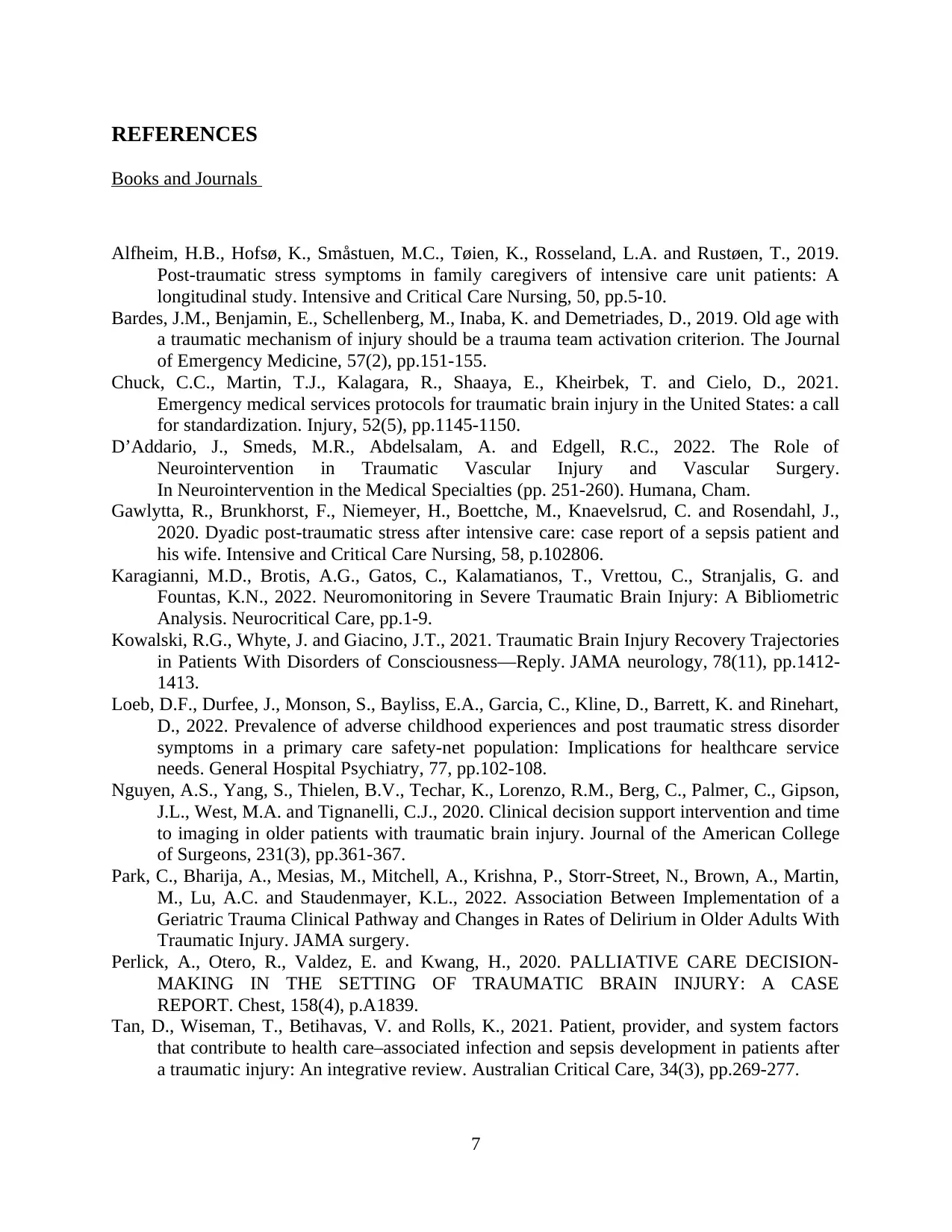
REFERENCES
Books and Journals
Alfheim, H.B., Hofsø, K., Småstuen, M.C., Tøien, K., Rosseland, L.A. and Rustøen, T., 2019.
Post-traumatic stress symptoms in family caregivers of intensive care unit patients: A
longitudinal study. Intensive and Critical Care Nursing, 50, pp.5-10.
Bardes, J.M., Benjamin, E., Schellenberg, M., Inaba, K. and Demetriades, D., 2019. Old age with
a traumatic mechanism of injury should be a trauma team activation criterion. The Journal
of Emergency Medicine, 57(2), pp.151-155.
Chuck, C.C., Martin, T.J., Kalagara, R., Shaaya, E., Kheirbek, T. and Cielo, D., 2021.
Emergency medical services protocols for traumatic brain injury in the United States: a call
for standardization. Injury, 52(5), pp.1145-1150.
D’Addario, J., Smeds, M.R., Abdelsalam, A. and Edgell, R.C., 2022. The Role of
Neurointervention in Traumatic Vascular Injury and Vascular Surgery.
In Neurointervention in the Medical Specialties (pp. 251-260). Humana, Cham.
Gawlytta, R., Brunkhorst, F., Niemeyer, H., Boettche, M., Knaevelsrud, C. and Rosendahl, J.,
2020. Dyadic post-traumatic stress after intensive care: case report of a sepsis patient and
his wife. Intensive and Critical Care Nursing, 58, p.102806.
Karagianni, M.D., Brotis, A.G., Gatos, C., Kalamatianos, T., Vrettou, C., Stranjalis, G. and
Fountas, K.N., 2022. Neuromonitoring in Severe Traumatic Brain Injury: A Bibliometric
Analysis. Neurocritical Care, pp.1-9.
Kowalski, R.G., Whyte, J. and Giacino, J.T., 2021. Traumatic Brain Injury Recovery Trajectories
in Patients With Disorders of Consciousness—Reply. JAMA neurology, 78(11), pp.1412-
1413.
Loeb, D.F., Durfee, J., Monson, S., Bayliss, E.A., Garcia, C., Kline, D., Barrett, K. and Rinehart,
D., 2022. Prevalence of adverse childhood experiences and post traumatic stress disorder
symptoms in a primary care safety-net population: Implications for healthcare service
needs. General Hospital Psychiatry, 77, pp.102-108.
Nguyen, A.S., Yang, S., Thielen, B.V., Techar, K., Lorenzo, R.M., Berg, C., Palmer, C., Gipson,
J.L., West, M.A. and Tignanelli, C.J., 2020. Clinical decision support intervention and time
to imaging in older patients with traumatic brain injury. Journal of the American College
of Surgeons, 231(3), pp.361-367.
Park, C., Bharija, A., Mesias, M., Mitchell, A., Krishna, P., Storr-Street, N., Brown, A., Martin,
M., Lu, A.C. and Staudenmayer, K.L., 2022. Association Between Implementation of a
Geriatric Trauma Clinical Pathway and Changes in Rates of Delirium in Older Adults With
Traumatic Injury. JAMA surgery.
Perlick, A., Otero, R., Valdez, E. and Kwang, H., 2020. PALLIATIVE CARE DECISION-
MAKING IN THE SETTING OF TRAUMATIC BRAIN INJURY: A CASE
REPORT. Chest, 158(4), p.A1839.
Tan, D., Wiseman, T., Betihavas, V. and Rolls, K., 2021. Patient, provider, and system factors
that contribute to health care–associated infection and sepsis development in patients after
a traumatic injury: An integrative review. Australian Critical Care, 34(3), pp.269-277.
7
Books and Journals
Alfheim, H.B., Hofsø, K., Småstuen, M.C., Tøien, K., Rosseland, L.A. and Rustøen, T., 2019.
Post-traumatic stress symptoms in family caregivers of intensive care unit patients: A
longitudinal study. Intensive and Critical Care Nursing, 50, pp.5-10.
Bardes, J.M., Benjamin, E., Schellenberg, M., Inaba, K. and Demetriades, D., 2019. Old age with
a traumatic mechanism of injury should be a trauma team activation criterion. The Journal
of Emergency Medicine, 57(2), pp.151-155.
Chuck, C.C., Martin, T.J., Kalagara, R., Shaaya, E., Kheirbek, T. and Cielo, D., 2021.
Emergency medical services protocols for traumatic brain injury in the United States: a call
for standardization. Injury, 52(5), pp.1145-1150.
D’Addario, J., Smeds, M.R., Abdelsalam, A. and Edgell, R.C., 2022. The Role of
Neurointervention in Traumatic Vascular Injury and Vascular Surgery.
In Neurointervention in the Medical Specialties (pp. 251-260). Humana, Cham.
Gawlytta, R., Brunkhorst, F., Niemeyer, H., Boettche, M., Knaevelsrud, C. and Rosendahl, J.,
2020. Dyadic post-traumatic stress after intensive care: case report of a sepsis patient and
his wife. Intensive and Critical Care Nursing, 58, p.102806.
Karagianni, M.D., Brotis, A.G., Gatos, C., Kalamatianos, T., Vrettou, C., Stranjalis, G. and
Fountas, K.N., 2022. Neuromonitoring in Severe Traumatic Brain Injury: A Bibliometric
Analysis. Neurocritical Care, pp.1-9.
Kowalski, R.G., Whyte, J. and Giacino, J.T., 2021. Traumatic Brain Injury Recovery Trajectories
in Patients With Disorders of Consciousness—Reply. JAMA neurology, 78(11), pp.1412-
1413.
Loeb, D.F., Durfee, J., Monson, S., Bayliss, E.A., Garcia, C., Kline, D., Barrett, K. and Rinehart,
D., 2022. Prevalence of adverse childhood experiences and post traumatic stress disorder
symptoms in a primary care safety-net population: Implications for healthcare service
needs. General Hospital Psychiatry, 77, pp.102-108.
Nguyen, A.S., Yang, S., Thielen, B.V., Techar, K., Lorenzo, R.M., Berg, C., Palmer, C., Gipson,
J.L., West, M.A. and Tignanelli, C.J., 2020. Clinical decision support intervention and time
to imaging in older patients with traumatic brain injury. Journal of the American College
of Surgeons, 231(3), pp.361-367.
Park, C., Bharija, A., Mesias, M., Mitchell, A., Krishna, P., Storr-Street, N., Brown, A., Martin,
M., Lu, A.C. and Staudenmayer, K.L., 2022. Association Between Implementation of a
Geriatric Trauma Clinical Pathway and Changes in Rates of Delirium in Older Adults With
Traumatic Injury. JAMA surgery.
Perlick, A., Otero, R., Valdez, E. and Kwang, H., 2020. PALLIATIVE CARE DECISION-
MAKING IN THE SETTING OF TRAUMATIC BRAIN INJURY: A CASE
REPORT. Chest, 158(4), p.A1839.
Tan, D., Wiseman, T., Betihavas, V. and Rolls, K., 2021. Patient, provider, and system factors
that contribute to health care–associated infection and sepsis development in patients after
a traumatic injury: An integrative review. Australian Critical Care, 34(3), pp.269-277.
7
⊘ This is a preview!⊘
Do you want full access?
Subscribe today to unlock all pages.

Trusted by 1+ million students worldwide
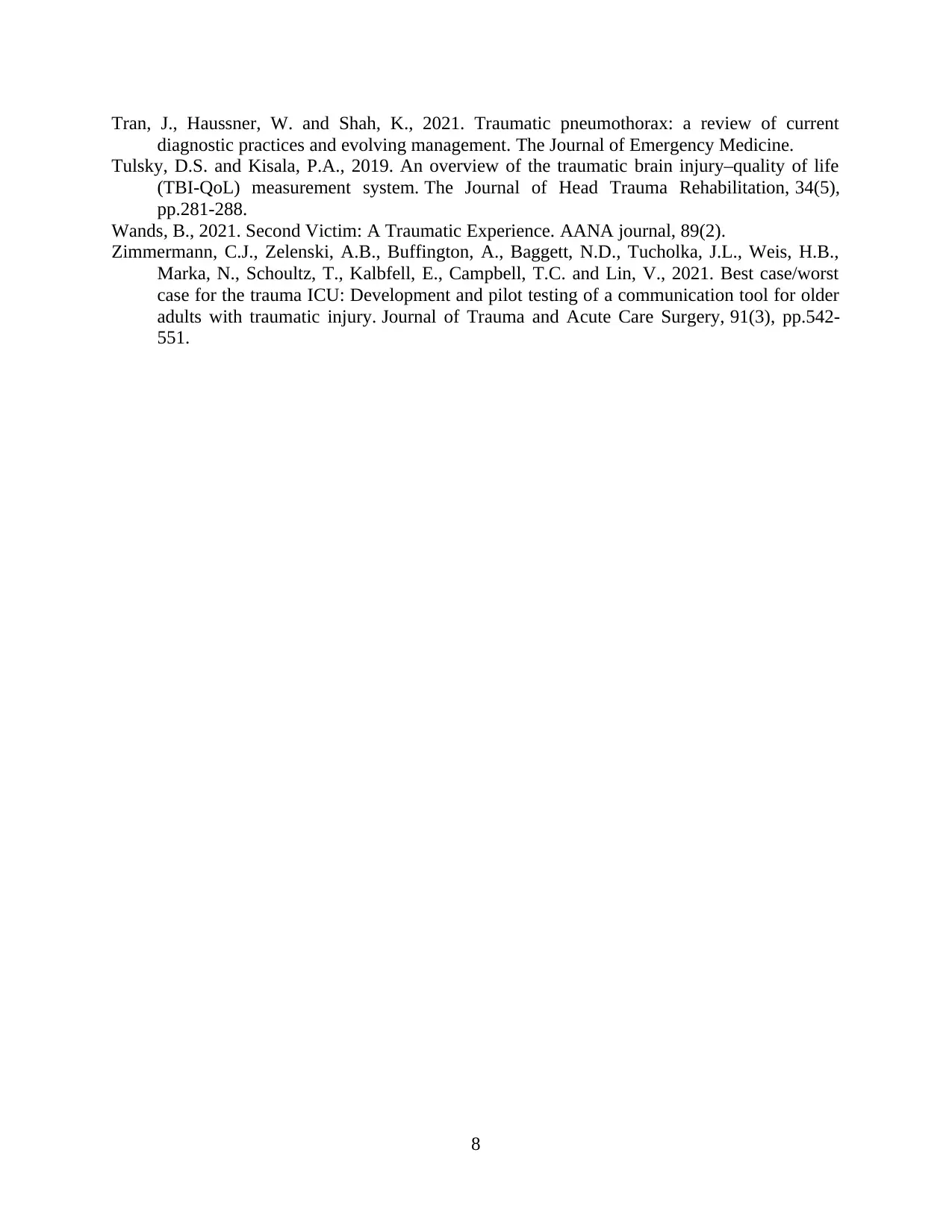
Tran, J., Haussner, W. and Shah, K., 2021. Traumatic pneumothorax: a review of current
diagnostic practices and evolving management. The Journal of Emergency Medicine.
Tulsky, D.S. and Kisala, P.A., 2019. An overview of the traumatic brain injury–quality of life
(TBI-QoL) measurement system. The Journal of Head Trauma Rehabilitation, 34(5),
pp.281-288.
Wands, B., 2021. Second Victim: A Traumatic Experience. AANA journal, 89(2).
Zimmermann, C.J., Zelenski, A.B., Buffington, A., Baggett, N.D., Tucholka, J.L., Weis, H.B.,
Marka, N., Schoultz, T., Kalbfell, E., Campbell, T.C. and Lin, V., 2021. Best case/worst
case for the trauma ICU: Development and pilot testing of a communication tool for older
adults with traumatic injury. Journal of Trauma and Acute Care Surgery, 91(3), pp.542-
551.
8
diagnostic practices and evolving management. The Journal of Emergency Medicine.
Tulsky, D.S. and Kisala, P.A., 2019. An overview of the traumatic brain injury–quality of life
(TBI-QoL) measurement system. The Journal of Head Trauma Rehabilitation, 34(5),
pp.281-288.
Wands, B., 2021. Second Victim: A Traumatic Experience. AANA journal, 89(2).
Zimmermann, C.J., Zelenski, A.B., Buffington, A., Baggett, N.D., Tucholka, J.L., Weis, H.B.,
Marka, N., Schoultz, T., Kalbfell, E., Campbell, T.C. and Lin, V., 2021. Best case/worst
case for the trauma ICU: Development and pilot testing of a communication tool for older
adults with traumatic injury. Journal of Trauma and Acute Care Surgery, 91(3), pp.542-
551.
8
Paraphrase This Document
Need a fresh take? Get an instant paraphrase of this document with our AI Paraphraser

9
1 out of 11
Related Documents
Your All-in-One AI-Powered Toolkit for Academic Success.
+13062052269
info@desklib.com
Available 24*7 on WhatsApp / Email
![[object Object]](/_next/static/media/star-bottom.7253800d.svg)
Unlock your academic potential
Copyright © 2020–2026 A2Z Services. All Rights Reserved. Developed and managed by ZUCOL.





